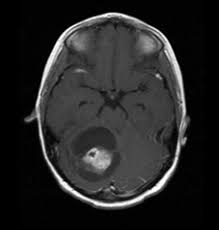 A benign brain tumor that rarely spreads into surrounding tissues.
A benign brain tumor that rarely spreads into surrounding tissues.
Originates in astrocytes, this type of tumor is slow-growing tumor but can become very large.
Usually treated successfully by surgery.
Pilocytic astrocytomas are the most common astrocytomas of childhood, counting for about 20% of brain tumors in children, adolescents, and young adults.
Pilocytic astrocytomas are grade I tumors.
They are considered benign and slow growing tumors.
Pilocytic astrocytomas frequently have cystic portions filled with fluid and a nodule, which is the solid portion.
Most are located in the cerebellum.
Therefore, most symptoms are related to balance or coordination difficulties.
They also occur more frequently in children and teens.
Pilocytic astrocytomas are generally slow growing and circumscribed.
Pilocystic astrocytomas are associated with a 10 year survival exceeding 90%.
Graded on scale I-IV.
The most commonly diagnosed benign brain tumor in children.
Also occurs in young adults.
Characterized by impaired balance, and coordination, headaches, nausea, vomiting, impaired vision, impaired speech and hydrocephalus.
Most of these tumors are located in the cerebellum and suprasellar region.
KIAA1549-BRAF fusion occurs in 80 to 90% of pilocytic astrocytomas, particularly those in the posterior fossa, and are associated with an increased overall survival.
Diagnostic imaging include magnetic resonance imaging (MRI), computed tomography (CT), or positron emission tomography (PET).
Treatment is to remove or reduce the size of pilocytic astrocytoma by surgery, and occasionally combined with radiation therapy or chemotherapy.
20% of the cases have a poor outcome with local recurrence or dissemination.
Surgical goal is to remove as much of the lesion as possible while trying to minimize damage to healthy tissue.
Radiation therapy dosage used in this procedure does not harm normal tissues.
